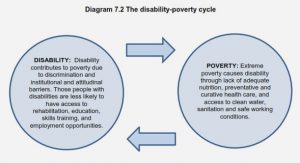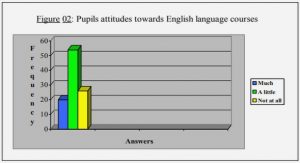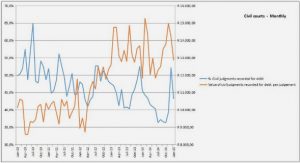Get Complete Project Material File(s) Now! »
A young healer’s story
This story is autobiographical. The Diagnostic Story A trainee in clinical psychology at master’s level experienced stomach pains over a period of several weeks. These were constant although fluctuating in intensity and severe enough to wake her at night. The trainee had been under heavy stress for some months. She was juggling employment with full-time studies as well as running a home with three young children, two of them below school-going age. In addition to this she was struggling with the personal demands of the programme in which she was enrolled. While she did not consult a medical practitioner for her pains, she believed that it was possible that she was suffering from an ulcer. Then, for reasons inexplicable to herself, after suffering the pains for several months, they disappeared without trace and never returned.
The Narrative
The young trainee had embarked on a second career at a time when her children were still very young. After the birth of the first child she had realised that she would need to be a breadwinner for the family and that her current career would not interest her for much longer. She had become increasingly interested and absorbed in the reading of psychology and so was thrilled when she was accepted into the master’s training programme at her university. She gave of herself with complete dedication and commitment but never realised what intense personal demands the training would make on her. Besides the personal demands which most trainees experience to a greater or lesser degree, she found herself struggling in her placement for practicals in a township. She had worked in the township for about two years as a teacher and so was surprised that her placement in the counselling clinic should present her with such a struggle as she was now experiencing.
THE ECOLOGY OF MINDS IN THE CONTEXT OF CHANGE
It is remarkable how several workers writing from diverse interests and theoretical positions have converged on the notion of a divided self. In different ways they moved from a recognition and delineation of the “divided self” to formulations about cleavages in the collective experience or consciousness of large groups. (Manganyi, 1977, p. 97). This chapter explores the ecology of indigenous helping and coping methods from the platform of observations made by the author in her roles as a counsellor and an academic working within a particular cultural environment, different from her own. This environment included the township, Mamelodi, where she ran a counselling unit for several years, although the boundaries were not restricted to this. However, all of the persons who contributed to Other Stories explored in chapter three and to The Story in chapter one, appertained to the local community in some way. What follows is a description of the township Mamelodi as a typical South African township, the local position of which is situated within a larger global context. Processes resulting from the interaction of these two positions are considered.
KNOWLEDGE BASE AS CULTURAL CONSTRUCT
What will follow in this chapter is a look at some themes from literature, relevant to this study, expounding on African and black psychology and philosophy. These are themes that have emerged from the culture, – and culture as a social construct, is seen to be inextricably intertwined with knowledge. Thus the themes could be viewed as forming part of local knowledge of the context. The purpose of presenting these ideas here is to sketch the one end of the knowledge continuum western – African, from whence rise some arguments for indigenous knowledge in an African context. The notion of a knowledge continuum in itself serves to reify the dialectic approach to knowledge. However, it is not the intention to further this dialectic, but rather to present some dissenting voices from the other side coming from the modernist frame, as a background to further dialogue of an alternative approach.
TABLE OF CONTENTS :
- Title page
- Acknowledgements
- Declaration
- Summary
- Table of contents
- CHAPTER ONE: THE STORY
- A Journal: The Story of Lesaka
- Reflection
- CHAPTER TWO: THE FLOW: INTRODUCTION TO THE STUDY
- The Context
- The Approach
- Area of Focus
- Background
- The Problem Defined
- The African, the Global and the Local in Psychology and Philosophy
- Ecologies and Paradigms
- Hegemony within Psychology
- The Narratives
- Layout of the Text
- CHAPTER THREE: OTHER STORIES
- The Term Diagnosis
- Definition of Diagnosis
- 1. Alice and Doozy
- The Diagnostic Story
- The Narrative
- 2. Thabo
- The Diagnostic Story
- The Narrative
- 3. Cabangile
- The Diagnostic Story
- The Narrative
- 4. Agape: A prototype community counselling centre?
- The Diagnostic Story
- The Narrative
- 5. A young healer’s story
- The Diagnostic Story
- The Narrative
- Concluding The Stories
- CHAPTER FOUR: THE ECOLOGY OF MINDS IN THE CONTEXT OF CHANGE
- The Context of Practice: The Township
- Socio-Political Flux of the Context of Practice
- Culture
- Falling Through the Cracks in the Culture
- Criticism of Psychology in Africa
- Indigenisation as an Approach
- Indigenisation as a Polarising Process
- Arguments for Indigenisation
- Arguments for Universality
- Local Institutionalisation Processes: Alienation?
- Globalisation-Particularisation
- The Local Position
- Alienation Within the Community
- Evolutionary Processes in South African Psychology
- Historical Development of the Context
- Alienation Through Prejudice
- Stories of Alienation Within the Profession
- Liberation from the Institution
- Well-Being and Psychopathology in Context
- Knowledge Base and Psychopathology
- Conclusion
- CHAPTER FIVE: KNOWLEDGE BASE AS CULTURAL CONSTRUCT
- Writing and The Oral Tradition
- CHAPTER SIX: RESEARCH PARADIGM CONSIDERED
- CHAPTER SEVEN: EXPLORING THE FLOW
- CHAPTER EIGHT: SOME CONCLUSIONS
GET THE COMPLETE PROJECT
Voice to the silent: An ecology of local knowledge in psychology






